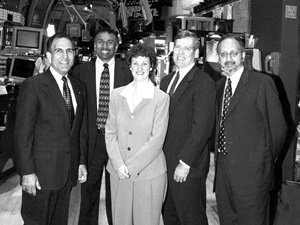 |
|
||
|
Vol. IV No. 22 · 9 February 2001 |
|||
B.U. Bridge is published by the Boston University Office of University Relations.
SMG receives $5 million from Lucent Technologies to study mobile Internet
By David J. Craig
The convergence of wireless communication and the Internet soon could dramatically change our lives, allowing us to do our banking by voice activation while driving, or even to turn off our stove from another state.
But how will the mobile Internet affect the way corporations conduct business in the 21st century? That's a question on the minds of researchers at the School of Management, which recently received a $5 million gift from Lucent Technologies, of Murray Hill, N.J., to participate in its international Mobility Innovation Initiative. The $10 million international research program, announced by Lucent last November, aims to bring together academia and industry to research and develop new business models conducive to the mobile Internet.
|
|
|
| SMG Dean Louis E. Lataif, Nalin Kulatilaka, an SMG professor of finance and economics, Stacey Gelman, vice president of Mobile Internet for Lucent's wireless networks group, John Henderson, an SMG professor and chairman of management information systems, and N. Venkatraman, an SMG professor of management information systems (from left), at a BU alumni event on the floor of the New York Stock Exchange last November, where Lucent Technologies announced a $5 million gift to SMG to study the impact of the mobile Internet on business. | |
The London Business School and France's INSEAD business school, two of the most highly respected international schools in the world, each received a $2.5 million gift from Lucent to explore the impact of mobility on business. The program is expected to spawn studies at the institutions on how consumers will be affected by devices such as PalmPilots and cellular phones, and by related inventions in the telecommunications and computer industries. The gifts are spread over the next five years.
"Mobility is about giving up space dependency so that people can do their job, or pay their electric bill, from anywhere in the world, whether they're on the beach or playing golf," says SMG Dean Louis E. Lataif. "There's a downside to that, of course, in that you're never off, but there's no question that the mobile Internet is coming, and it's going to change the way we all live and work.
"We're proud to work with Lucent Technologies to attempt to determine the impact of future Internet technology on our society," he continues. "Lucent's investment represents a ringing endorsement of our belief that research must be based on rigorous academic practices and be useful in the real world. The $5 million is especially impressive because it is an unrestricted gift, not a research grant given in exchange for particular results."
Lataif says the money may be spent partly to found a new research facility, the Boston University Institute for Leading in a Dynamic Economy (BUILD). The proposed institute, which has yet to be approved by BU's Board of Trustees, would concentrate on studying the mobile Internet.
"Through the institute, we would try to attract visiting scholars, fellows, and corporate executives from around the world who are working on mobility to collaborate with our own researchers and contribute to our learning in this area," says Lataif. "The assumption is that we will keep this line of work going after the period of the gift."
Lataif credits the work of such SMG faculty members as John Henderson, a professor of management information systems and chairman of the department, Nalin Kulatilaka, a professor of finance and economics, and N. Venkatraman, a professor of management information systems, with having attracted the Lucent gift. Through SMG's Systems Research Center, all three conduct research applicable to the mobile Internet, such as how mobility impacts organizational forms, customer behavior, markets, and corporate strategy.
Kulatilaka will serve as research director for BU's participation in the Mobility Innovation Initiative. Several other SMG faculty members already plan to participate in new projects about mobility, Lataif says. The research will be done in collaboration with the Systems Research Center's industry partners, such as Lucent, IBM, and AT&T.
According to Stacey Gelman, vice president of Mobile Internet for Lucent's wireless networks group, research done at SMG, the London School of Business, and INSEAD will benefit Lucent by helping to identify markets for the company's high-tech products. Lucent designs computer systems, software, and services for computer service providers and enterprises, focusing especially on broadband and mobile Internet infrastructure.
"The faster we create the next-generation business models that will deliver the value that the mobile Internet promises, the faster we advance in creating the market for innovative, revenue-generating services," says Gelman. "We are uncovering a new area of research focused on business processes and opportunities for competing in a dynamic economy. While other partnerships focus specifically on next-generation technologies, the Mobility Innovation Initiative is creating the new business models and services that next-generation technologies will require."
For more information on Lucent Technologies, visit http://www.lucent.com.
![]()
8
February 2001
Boston University
Office of University Relations
